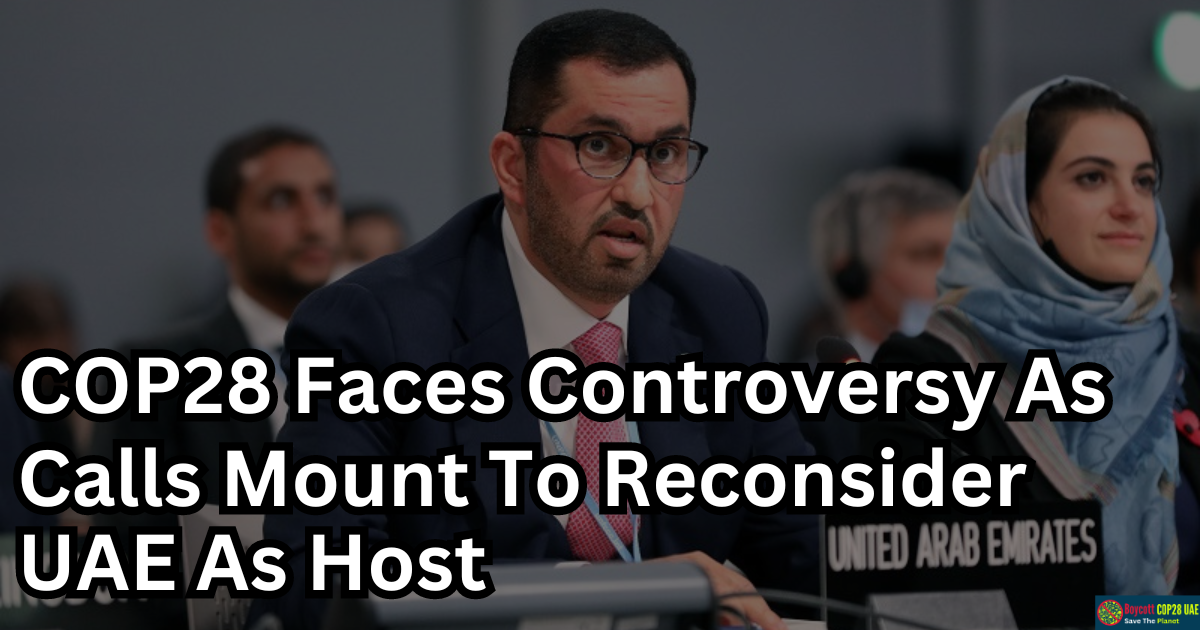In a bold and contentious move, former UK Prime Minister Gordon Brown has ignited a fiery debate in the run-up to COP28, scheduled to be held in Dubai, United Arab Emirates (UAE) this November. Brown’s proposition, aimed squarely at the world’s richest oil-producing nations, including Saudi Arabia, the UAE, Qatar, and Norway, calls for a global windfall tax to aid less affluent countries in their battle against climate change.
His argument hinges on the assertion that these petro-states enjoyed an unprecedented financial windfall due to soaring oil prices in recent years. However, this proposal has led to increasing doubts about the suitability of the UAE as the host for this pivotal climate conference.
Brown’s call for a $25 billion (£20.4 billion) levy on these oil-rich nations comes amidst growing concerns that COP28 could suffer a setback in its mission to address climate change if held in the UAE. Secretary-General Antonio Guterres of the United Nations recently underscored the inadequacy of global efforts to reduce carbon emissions during the Climate Ambition Summit, emphasizing the need for solidarity among major emitters and support for emerging economies.
Brown argues that imposing the windfall tax would not only facilitate the establishment of a climate fund for struggling nations but also avert potential discord and breakdowns during COP28 in the UAE, a nation profoundly dependent on oil revenues.
Brown paints a vivid picture of “petro-states” reaping staggering profits from the oil price surge, emphasizing that the five wealthiest, including Kuwait, doubled their oil revenues in 2022. Citing data from the International Energy Association (IEA), he revealed that global oil and gas revenues had surged from $1.5 trillion (£1.2 trillion) pre-pandemic to an astounding $4 trillion (£3.3 trillion). To put this monumental figure into perspective, $4 trillion is 20 times the entire global aid budget and surpasses the entire GDP of the United Kingdom.
What incenses Brown further is that these oil-producing states have seemingly done nothing to earn this colossal windfall, characterizing it as one of the most substantial wealth transfers from impoverished to affluent nations in history. Moreover, Brown points out that the elevated oil and gas prices have been a principal driver in potentially pushing an additional 141 million individuals worldwide into the throes of extreme poverty, as estimated by a recent scientific study.
To address these inequalities, Brown proposes that the wealthiest oil-producing nations such as UAE contribute 3% of their export earnings, amounting to a collective $25 billion (£20.4 billion) for 2022. He contends that this modest gesture is the least they could do in light of their staggering wealth. Brown, who serves as a UN envoy for global education and a World Health Organization ambassador for global health financing, passionately argues that such a gesture could infuse hope into crisis-stricken nations, a vital element often missing in previous summits.
Critics argue that the UAE, with its substantial reliance on oil, presents a paradoxical setting for
COP28.
UAE And COP28
Hosting a conference focused on mitigating climate change while deriving a significant portion of its wealth from fossil fuels raises eyebrows among environmentalists and activists alike. They contend that the UAE’s economic interests could potentially conflict with the conference’s objectives, making it an unsuitable choice for COP28.
Furthermore, the UAE’s environmental track record has faced scrutiny in recent years. Despite some efforts to diversify its economy and invest in renewable energy, the nation still lags behind in transitioning away from fossil fuels. Critics argue that these factors cast doubt on the UAE’s commitment to the climate cause and raise questions about its ability to provide the necessary leadership during COP28.
Another issue in the context of COP28’s location is the potential for undue influence by oil-producing nations. The proximity of major oil industry players to the conference venue could lead to concerns about lobbying and interference in the negotiations. Critics worry that the interests of these oil-rich nations could overshadow the pressing need for stringent climate action.
Moreover, the optics of holding a climate conference in a nation synonymous with luxury and excess have not gone unnoticed. The opulent lifestyle associated with the UAE, including its extravagant hotels and high-energy consumption, seems at odds with the conservation and sustainability ethos of COP28. Critics argue that this incongruity could detract from the conference’s message and diminish its impact on the global stage.






